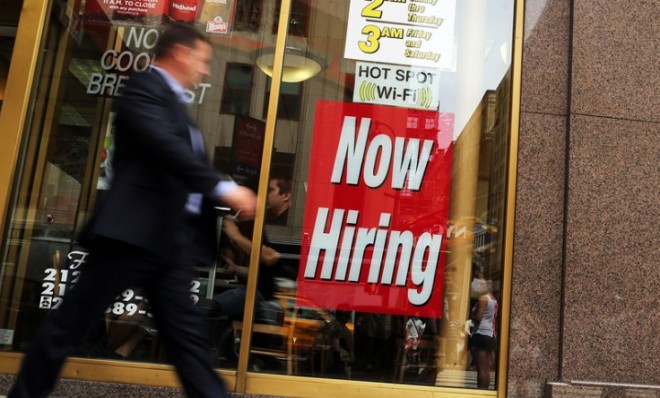Today in business: 5 things you need to know
Unemployment falls to a four-year low, consumer confidence dips, and more in our roundup of the business stories that are making news and driving opinion


A free daily email with the biggest news stories of the day – and the best features from TheWeek.com
You are now subscribed
Your newsletter sign-up was successful
1. JOB GROWTH BRINGS UNEMPLOYMENT TO FOUR-YEAR LOW
The economy added 146,000 non-farm jobs in November, pushing the unemployment down from 7.9 percent to 7.7 percent, the lowest it's been in four years. Last month's job gains were far better than expected — economists had predicted a rather meager gain of just 93,000 jobs — partly because Hurricane Sandy didn't slow down hiring in the Northeast as much as feared. The news buoyed stocks, but just a bit, as the Labor Department shaved 33,000 off its previous estimate of October's job growth, bringing it down to 138,000. Also, some of the decrease in the unemployment rate stemmed from the fact that more people gave up looking for work. "The labor market is not getting worse," says Jacob Oubina, a senior U.S. economist at RBC Capital Markets in New York, "but is also not getting much better." [Reuters]
………………………………………………………………………………
The Week
Escape your echo chamber. Get the facts behind the news, plus analysis from multiple perspectives.

Sign up for The Week's Free Newsletters
From our morning news briefing to a weekly Good News Newsletter, get the best of The Week delivered directly to your inbox.
From our morning news briefing to a weekly Good News Newsletter, get the best of The Week delivered directly to your inbox.
2. CONSUMER BLUES HOLD DOWN STOCKS
Consumer confidence dipped in early December to its lowest point since August, according to a survey released Friday. The consumer pessimism caused major stock indexes to give up early gains they had made thanks to the better-than-expected jobs report. The main reason for the mood swing among consumers appeared to be investor worries over the stalemate in Washington on how to avoid the "fiscal cliff" of economy-busting tax hikes and spending cuts scheduled for Jan. 1. "While it (consumer confidence data) is just one measure of consumer sentiment, maybe the constant barrage of back and forth in D.C. with no resolution yet is having an impact," said Peter Boockvar, managing director at Miller Tabak & Co in New York. [Reuters]
………………………………………………………………………………
3. CONSUMER REPORTS DISPUTES FORD HYBRID MILEAGE
A free daily email with the biggest news stories of the day – and the best features from TheWeek.com
Ford is taking a beating in the latest issue of Consumer Reports, which found that two flagship Ford hybrids fell far short of the mileage they promised. Consumer Reports said that in its tests the Ford Fusion Hybrid delivered only 39 mpg in highway and city driving — Ford promises 47 mpg — and the C-Max Hybrid only got 37 mpg, instead of the 47 mpg Ford claims. The 20 percent difference was the largest for any vehicles the magazine tested. Most others were within 2 mpg. Ford says it "cannot speak" for Consumer Reports' tests, but that other analysts have praised its hybrids, and even found in some cases that they exceeded expectations. [Forbes]
………………………………………………………………………………
4. GOOGLE STOPS OFFERING SMALL BUSINESSES FREE APPS
Google says it's phasing out the free version of its Google Apps software suite for small businesses. Existing customers will be able to continue using their accounts without paying, but all new subscribers — big or small — will have to sign up for the Google Apps for Business Premium version, which costs $50 a year per user. The company said in a blog post last year that the service has more than 40 million users, most of whom were believed to be using the free service. Google's main competitor, Microsoft's "Office 365" online service, offers an email service and online versions of Word, PowerPoint, and Excel from $6 per user, per month. [TechCrunch]
………………………………………………………………………………
5. ECONOMISTS PROPOSE $1 TRILLION COINS TO AVOID DEBT-CEILING FIGHT
Another showdown over raising the debt ceiling is looming. Unless Congress raises the limit, the Treasury Department will hit its $16.4 trillion borrowing ceiling by February, and the government will run short of money to pay its bills. If Republicans resist raising the limit, insisting on spending cuts in exchange, the Obama administration has another option, scholars say. It can mint as many coins as it wants, and assign any value it wants. So, the theory goes, it could have the U.S. Mint make two $1 trillion platinum coins, move them through the Federal Reserve to Treasury's accounts, and — voila — the administration suddenly has the money it needs for two more years with no more borrowing. "I like it," Joseph Gagnon of the Peterson Institute for International Economics tells The Washington Post. "There's nothing that's obviously economically problematic about it." [Washington Post]
Harold Maass is a contributing editor at The Week. He has been writing for The Week since the 2001 debut of the U.S. print edition and served as editor of TheWeek.com when it launched in 2008. Harold started his career as a newspaper reporter in South Florida and Haiti. He has previously worked for a variety of news outlets, including The Miami Herald, ABC News and Fox News, and for several years wrote a daily roundup of financial news for The Week and Yahoo Finance.
-
 Why are election experts taking Trump’s midterm threats seriously?
Why are election experts taking Trump’s midterm threats seriously?IN THE SPOTLIGHT As the president muses about polling place deployments and a centralized electoral system aimed at one-party control, lawmakers are taking this administration at its word
-
 ‘Restaurateurs have become millionaires’
‘Restaurateurs have become millionaires’Instant Opinion Opinion, comment and editorials of the day
-
 Earth is rapidly approaching a ‘hothouse’ trajectory of warming
Earth is rapidly approaching a ‘hothouse’ trajectory of warmingThe explainer It may become impossible to fix
